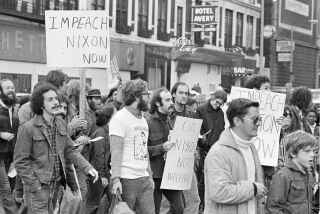This Is No Time to Be Looking Back
- Share via
Unfortunately, the 50th anniversary of Pearl Harbor finds Americans full of bittersweet reflections, looking backward to a time when America supposedly lived in splendid isolation from the messy outside world, looking forward fearfully from the perspective of a lingering recession.
The vision that accompanied the Gulf War triumph, not to mention the collapse of communism two years ago, is now absent. Threats are seen across the globe, from an economically strong Japan to a unifying Europe.
The foundering republics of the vanquished Soviet Union are seen as poor relations looking for a loan or armies on the verge of civil war.
But that American perspective is all wrong. This is not a time for looking back. The world is entering a new era, one that can be filled with opportunity--or danger.
Vision is needed, such as that of the eminent Asia scholar Robert A. Scalapino, now professor emeritus at the University of California at Berkeley. Scalapino calls this the “greatest revolutionary age in the history of mankind” because more than ever before people are demanding improved living standards and their political leaders are having to listen. Economics is taking precedence over politics, and to Scalapino that represents progress.
Some business people share his vision--investment managers raising $250 million in venture capital for Soviet entrepreneurs, General Motors preparing to produce automobiles in Poland, the makers of Johnson’s Wax opening a plant in the Ukraine.
Economist David Hale of Kemper Securities foresees an enormous expansion of the world economy. Until now, Hale explains, the global economy basically amounted to the 800 million people living in the 25 developed nations of Western Europe, North America and Japan--the members of the Organization for Economic Cooperation and Development. Another 400 million living in developing countries were on the margin of the world economy.
But now economic choice and higher living standards are opening up to nearly 4 billion people, says Hale, because investment can flow to countries that only yesterday lived under communist dictatorships or governments that retarded development, such as those of India and Latin America.
Such an expansion comes in the nick of time because the old world economy, which depended heavily on exporting goods and services to the United States, is running out of steam. For the last decade, the United States borrowed to continue taking the imports of the OECD economies. But this year, with the recession cutting U.S. imports, export sales of the 24 other OECD countries have retreated to the levels of 1988.
European economies are struggling; Japan’s is in a swoon. U.S. business also suffers--exports that rose 13% in 1989 and 8% last year are down 17% this year.
The old world economy has other troubles. After a decade of debt-financed overbuilding, real estate is declining in Tokyo as well as in U.S. cities. Germany, meanwhile, must put $70 billion a year--5% of its annual output--into eastern Germany to work off the overvaluation of properties that accompanied reunification.
Finally, there is danger in the dismembering Soviet Union. The independent Ukraine and Russian republics are suffering hyperinflation--like Germany in the 1920s, when people needed wheelbarrows full of currency to buy a loaf of bread. In Germany, that phase set the stage for dictatorship and war. Today in Russia, discharged soldiers wander the land, homeless and hungry.
What is needed, say economic and political experts, is a recognition of how crucial and promising these times are. Many are calling for a post-Cold War global conference, comparable to the one at Bretton Woods that organized the world economy after World War II.
“The new republics have held free elections; they could work with such a conference,” says Jeremy Azreal, a Soviet specialist at Rand Corp. who has just returned from Russia and the Ukraine.
Meanwhile, U.S. business contacts with the Soviet republics are proceeding. Dwayne Andreas, chairman of Archer Daniels Midland, is in Russia organizing food and grain shipments. Dean LeBaron of Batterymarch Financial Management and Dennis Tito of Wilshire Associates are organizing a fund to invest in Soviet enterprises. It now has the backing of U.S. government insurance.
The opportunity in the Soviet Union can be immediate, says Tito, “because the people are educated and developed. They are ready to be a market for U.S. goods and services.”
Johnson’s Wax, reportedly, is in on the ground floor in the Ukraine because there is no other producer of household products.
The contrast of the new world with that of the years before World War II is enormous. Then, the U.S. economy was still in depression, one person in five was out of work, the poor had rickets and the rich had servants. Japan was so poor that in the western provinces a farmer’s unmarried daughter had no choice but life in a brothel.
Both countries have come a long way in the last 50 years. And with many other countries, they will go a long way in the next 50. That’s the reflection that should accompany this Pearl Harbor week.
More to Read
Inside the business of entertainment
The Wide Shot brings you news, analysis and insights on everything from streaming wars to production — and what it all means for the future.
You may occasionally receive promotional content from the Los Angeles Times.










